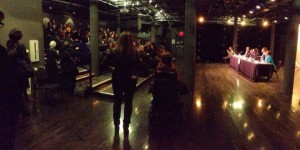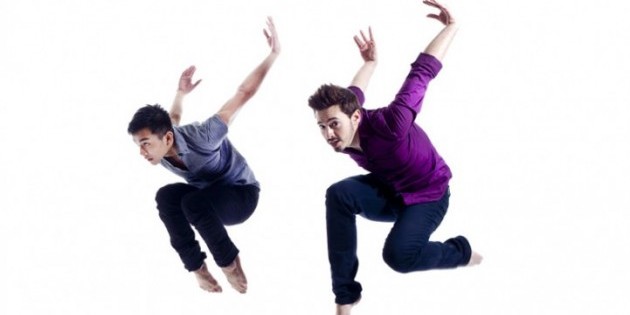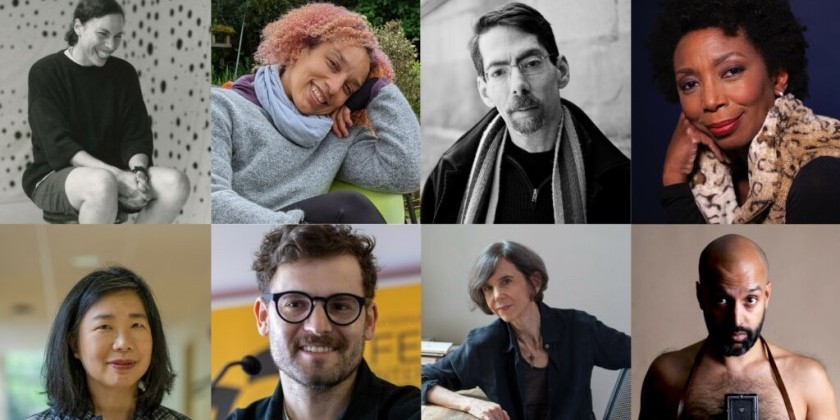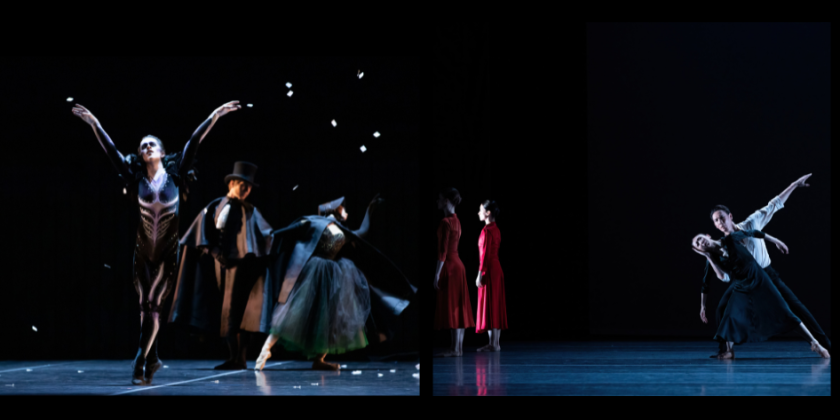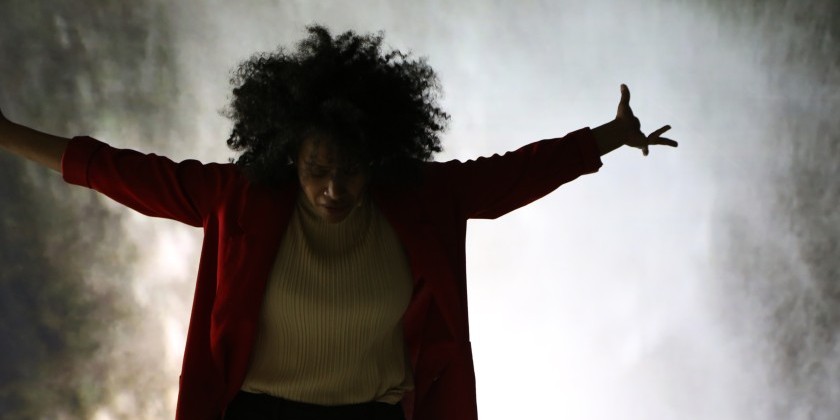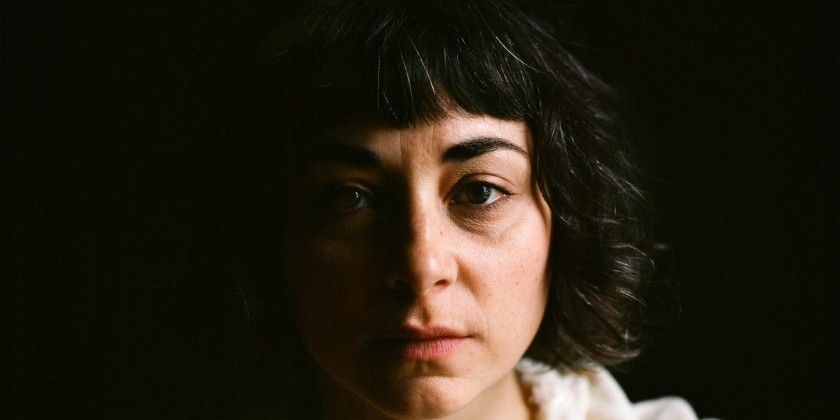DANCE NEWS: New Podcast "Dances with Robots" Premieres on November 14
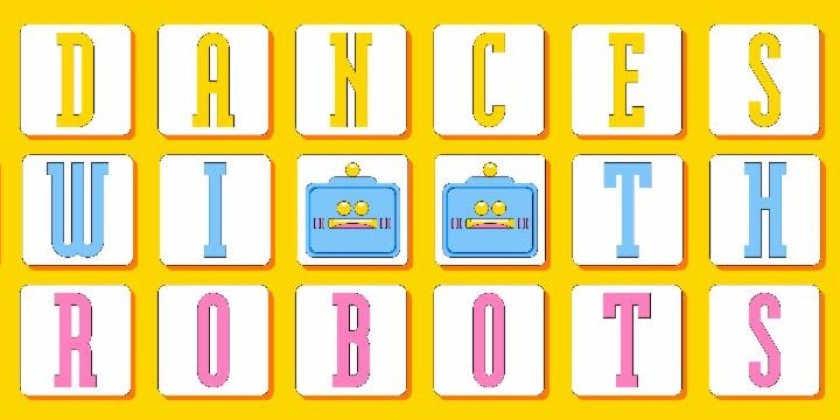
Presented by The Conference for Research on Choreographic Interfaces (CRCI), Hosted by Choreographer Sydney Skybetter & Co-Hosted by Ariane Michaud
The Conference for Research on Choreographic Interfaces (CRCI) presents Dances with Robots: a podcast catalyzed by the corporeal risks and expressive opportunities of contemporary technologies. Join our host, choreographer and Dean at Brown University, Sydney Skybetter, and Co-Host, Ariane Michaud, Executive Director of CRCI, alongside a series of guest hosts, as we explore the ways in which artists, activists and technologists navigate the world through interdisciplinary practice. The podcast premieres Tuesday, November 14, 2023, with new episodes on Tuesdays and Thursdays mornings. For more information, visit https://danceswithrobots.org/podcast.
"This podcast is the result of a decade of collaborative research at the intersection of computation and choreography. But it's also an extremely personal reflection about becoming an artist in the post 9/11 era and balancing the want to create against the inevitable compromise of personal safety and moral hazard,” says host Sydney Skybetter.
"It has always been a dream of mine to produce a podcast, and a few years ago, I pitched the idea to Sydney in a meeting, almost as a joke! However, once we received support not only from the university but also from the Sloan Foundation and the Brown Arts Institute, it transformed into a serious endeavor. Our goal is not just to tell our story, but to outline what it means to conduct research at the intersection of movement and emerging technology. For years, people have asked us, 'Why dance?' This project provided us with an opportunity to truly answer that question,” says Co-Host and Executive Producer, Ariane Michaud.
"All manner of disruptive, military-adjacent AI and robotic technologies are poised to radically reconfigure the dance field, and the world. I think dance is a useful lens to understand these technologies, how they relate to our bodies as we move through space and time. Dances with Robots is our attempt to understand what it means to be fleshily embodied in an increasingly disembodied era,” says host Sydney Skybetter.
The Team:
Host: Sydney Skybetter
Co-Host & Executive Producer: Ariane Michaud
Archivist and Web Designer: Kate Gow
Podcasting Consultant: Megan Hall
Accessibility Consultant: Laurel Lawson
Music: Kamala Sankaram
Audio Production Consultant: Jim Moses
Assistant Editor: Andrew Zukoski
Student Associate: Rishika Kartik
Episode List:
Episode 1: The Nerd Gaggle
Tuesday, November 14th 6:30 am
Welcome to Dances with Robots! In this introductory episode, Sydney Skybetter recounts the beginnings of the Conference for Research on Choreographic Interfaces, aka CRCI (pronounced Circe, like the Greek sorceress), and breaks down how, and why, we work in dance and emerging technologies.
Special Guests:
Kevin Clark has been part of the CRCI team since before the very first convening and has been a host and facilitator as well as an advisor for the last decade. Currently, Kevin is a Senior Manager at VMware Tanzu Labs, formerly Pivotal Labs. He leads a team of consultants building technology with government, educational, and social impact clients. Before joining industry, Kevin served as New Music USA's Director of Platform, and consulted with Stanford's Digital Civil Society Lab, Creative Capital, the MAP Fund, and others. Kevin is a composer, whose theatrical works draw on source material ranging from a letter Hildegard of Bingen wrote to Eleanor of Aquitaine to the Twitter bot Census Americans.
Kristen Bell (she/her) is a dancer, educator, and arts administrator. As a performer, Kristen has danced with GERALDCASELDANCE, Margaret Jenkins Dance Company, Molissa Fenley, Robert Moses' Kin, Skybetter + Associates, TAKE Dance, and American Repertory Ballet, among others. She has taught ballet and modern technique at Tisch School of the Arts, Princeton University, Boston Conservatory, Randolph College, ODC School, Shawl-Anderson Dance Center, Sharron Miller's Academy of Performing Arts, and Lydia Johnson Dance School. She is currently teaching at Rutgers Mason Gross School of the Arts. Kristen graduated from Princeton University with a degree in Ecology and Evolutionary Biology and a certificate in Dance, and she holds an MFA from NYU Tisch School of the Arts.
Jordan Isadore was born and raised in Northern California and started dancing as a young child. He continued his studies at California State University Long Beach, where in 2009 he received his B.F.A. in dance. While at CSULB Jordan was the recipient of the Baker Scholarship, a two-time recipient of the Lana Alper Dance Scholarship, and was awarded outstanding service to the Department of Dance from the CSULB College of the Arts and dance faculty. During his studies he was fortunate enough to perform works by Twyla Tharp, Marie De La Palme, Jodie Gates, Keith Johnson, Sophie Monat, as well as many others. Since graduation he's been working as a freelance dancer and traveling the world. In addition to working with Christopher Williams Isadore has recently worked with LA Company Bodytraffic, performing works by Barak Marshall, Club Guy & Roni, as well as Alex Ketley. He has also worked with Shen Wei Dance Arts and has performed at the David H. Koch Theater, Mariinsky Theater, throughout China, South America and Europe. His own work has been presented at The Museum of Arts & Design, 92nd Street Y, Joe's Pub, Madame Tussauds, and The American Dance Festival.
Katherine Helen Fisher is an EMMY- Award-nominated director researching choreographic forms at the confluence of expanded cinema, performance, and interactive new media. Her creative practice incorporates choreography, emerging technology, and education. Katherine works as an advocate for sustainable labor practices within the field of contemporary art by championing more equitable renumeration for cultural workers. Previously, Katherine danced with The Lucinda Childs Dance Company and has also performed with MOMIX, ODC San Francisco, the Merce Cunningham Trust and Johannes Wieland among others and as an ensemble member of the Philip Glass opera Einstein On The Beach directed by Robert Wilson. As a director, Katherine has directed projects for Radiohead, Rufus Wainwright, Hermès and Microsoft. Her work has been presented by WNET, Los Angeles Dance Project, Judson Church, Danspace Project, The Hammer Museum and The REDCAT among others. She developed a participatory performance garment, Le Monstre, which won a Jury Prize for Best Paper at The 21st International Symposium on Wearable Computers. She is cofounder of Safety Third Productions, a digital media design studio, and mother of two-year-old Frances Leigh Fisher. She holds an MFA in dance at Sarah Lawrence College and a BFA from NYU's Tisch School of the Arts.
Keira Heu-Jwyn Chang was a triple-major in Ballet, Astrophysics, and Philosophy at the University of Utah before pursuing Cultural and Arts Management at American University. Chang worked at the Association of Performing Arts Presenters and New York City Center Theater. She spent two years with a small venture capital firm gaining fluency in financial and business planning, investment, and securities regulation. She currently serves as Executive Director of the stellar Kate Weare Company and Studio Manager for artist Kyle McDonald. Chang continues to pursue projects at the intersection of technology and the arts as a freelance photographer, graphic designer, web developer, electronics fabricator and interactive installation designer. She has worked with Gibney Dance's Digital Technology Initiative and Barnard College's Movement Lab to teach and mentor dance artist interest in integrating technology in their creative practice. Her newest venture, DADA – The Dance Arts Data App, is a web based application designed to be a free tool and a knowledge base of fundraising, marketing and administrative information for dance organizations.
Kiri Miller is Professor of American Studies at Brown. Her work focuses on participatory culture, interactive digital media, popular music, and virtual/visceral performance practices. Her current research project investigates "insomniac listening" via sleepcasts and meditation apps: app-based audio content that promises to put listeners to sleep. Building on her previous work on "intimate media," Miller analyzes how these audiocentric self-care products circulate across platforms and drive discourse about anxiety, wellness, and sonic comfort. Kiri's most recent book, Playable Bodies: Dance Games and Intimate Media (Oxford, 2017), shows how dance video games transmit choreography, teach "kinesthetic listening", invite experimentation with gendered and racialized movement, and stage domestic surveillance as intimate recognition. Playable Bodies was the recipient of the de la Torre Bueno Book Award from the Dance Studies Association and the Alan Merriam Prize from the Society for Ethnomusicology. Miller is also the author of Playing Along: Digital Games, YouTube, and Virtual Performance (Oxford, 2012) and Traveling Home: Sacred Harp Singing and American Pluralism (Illinois, 2008). Kiri completed the Ph.D. in Music (Ethnomusicology) at Harvard in 2005 and was a Killam Memorial Postdoctoral Fellow at the University of Alberta before joining the Brown faculty in 2007. She has published articles in Ethnomusicology, New Media & Society, Game Studies, American Music, 19th-Century Music, the Journal of American Folklore, Oral Tradition, and the Journal of the Society for American Music. In 2010-11 she held fellowships from the Radcliffe Institute for Advanced Study and the American Council of Learned Societies. Kiri's regular course offerings include Musical Youth Cultures, Making Music American, Virtual Bodies, Music and Technoculture, and Popular Music Studies.
Episode 2: Oh Great, The Nazis Were Into Modern Dance: A Conversation with Kate Gow
Tuesday, November 14th 6:30 am
Kate Gow, CRCI's archivist and web designer, sits down with host Sydney Skybetter to discuss historical intersections of dance and technology. Turns out that the weird history of dancers catching on fire, Degas, and the Nazis have a lot to do with the dance of the future.
Special Guest:
Kate Gow is an archivist and designer of digital spaces. Her work revolves around memory, the body, and how we interact and perform with technology. She graduated as valedictorian from The Boston Conservatory, pioneering the Conservatory's first emphasis in Dance & Technology. In her sixth year with CRCI, she is moved to be documenting the conference that unveiled to her the power and significance of artistic intelligence. You can find her in performance and behind the scenes as a Senior Professional Services Consultant at Quadient.
Episode 3: The One With Tom Cruise
Thursday, November 16th 6:30 am
Sydney Skybetter interviews John Underkoffler, the Science and Technology Advisor for the 2002 movie Minority Report. We talk about how the infamous computer-gesture scene that made John famous led to the founding of Oblong Industries,a company that tried to make Minority Report's speculative interfaces a reality.
Special Guest:
John Underkoffler is an innovator, entrepreneur, computer scientist, and the co-founder/CEO of Oblong Industries. His foundational work at the MIT Media Laboratory included innovations in real-time computer graphics systems, large-scale visualization techniques, and the I/O Bulb and Luminous Room systems. He invented G-Speak, the human-to-machine communication system featured in Minority Report, and has since served as the scientific advisor for films such as The Hulk (A.Lee), Aeon Flux, and Iron Man. Oblong Industries has collaborated with firms across architecture, defense, aerospace, and IT sectors, including companies such as IBM, Boeing, and Raytheon. John is also active on several boards and serves as adjunct professor in the USC School of Cinematic Arts.
Sydney Skybetter sits down with performance historian Doug Eacho to discuss emergent technologies of the last century. They explore how sci-fi has influenced our expectations for the future of performance, and why these expectations almost never become reality.
Special Guest:
Douglas Eacho is a performance historian and theater director. His current research project concerns artists and engineers who have sought to automate theatrical processes, from French surrealists, to lighting board designers, to contemporary makers of algorithmic dance. He explores the increasing integration between automaticity and theatricality on and off the stage, and the shifting ways technology performs amidst conditions of economic stagnation. Another research thread concerns the long history of statistical representation as it has intersected with naturalist and aleatory performance; this work informed his article "Serial Nostalgia: Rimini Protokoll's 100% City and the Numbers We No Longer Are" (Theatre Research International, 2018). His reviews have been published in Theatre Survey, Theatre Journal, and Theatre and Performance Design. Before his doctoral studies, his found-text performances were presented around New York City, including at the Invisible Dog, Judson Memorial Church, and the Center for Performance Research. His Fear of a Lonely Planet, a piece about tourism, was devised with Stanford University students in 2018.
FOR MORE INFO on "DANCES WITH ROBOTS" CLICK HERE...







